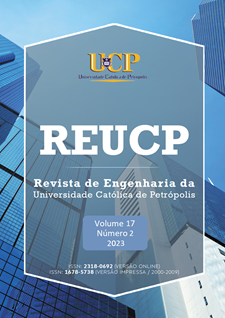IMPACTS OF THE LEED CERTIFICATION PROCESS ON CIVIL CONSTRUCTION
Abstract
Society is currently increasingly concerned about the environment and construction is moving in the same direction. The idea of buildings aimed at sustainability has grown and shown to be important in both the environmental and economic scenarios. To recognize these ideas applied in civil construction, there is the international Leadership in Energy and Environmental Design (LEED) certification that uses evaluation criteria, such as energy sufficiency, rational use of water resources, adoption of new technologies, reduction of the environmental impact of the work , use of materials and resources that do not harm the environment. This article aims to qualitatively present the LEED certification implementation process during the execution of a project, aiming to analyze the economic, execution and organization, and planning impacts. For this, a case study was carried out during the construction period of a vocational education institution located in Serra, Espírito Santo (ES), in 2019, where old and revised projects, activities and modified attitudes at the construction site were analyzed, respecting the requirements required by the certifying entity Green Building Council (GBC) Brazil. In summary, the results showed that through the implementation of LEED certification, there was a great impact on activities at the building lands and on the initial and final costs of the project, in addition to an immense reduction in environmental impact, contributing to sustainability practices and the well-being of society.
Downloads
Downloads
Published
Issue
Section
License
Autores que publicam nesta revista concordam com os seguintes termos:
I. O autor detém o copyright da sua contribuição, que abrange todos os objetos digitais que podem resultar na publicação eletrônica subsequente ou de distribuição. Após a aceitação da obra, o autor concede definitivamente à Editora o direito de primeira publicação da obra.
II. Ao enviar sua contribuição à REUCP, o autor assume e garante que:
1. Não foi previamente publicada nem está sendo avaliada por outra editora ou veículo de comunicação;
2. Não está pendente de revisão, exceto das eventualmente exigidas durante o processo editorial da REUCP;
3. As opiniões emitidas em sua obra são de sua inteira e exclusiva responsabilidade;
4. A obra não contém declaração falsa ou violação de trabalhos ou de direitos de terceiros;
5. A obra não contém difamação, invasão de privacidade ou assunto ilegal;
6. A revista poderá submeter seu original à avaliação de pessoas qualificadas e conservará sigilo e anonimato dos seus avaliadores/pareceristas;
7. A revista tem o direito de efetuar, em seu original, alterações de ordem normativa, ortográfica e gramatical, com vistas a manter o padrão culto da língua, respeitando, porém, o estilo autoral;
8. Concorda em indenizar a Editora UCP por violação de direito autoral ou qualquer outro processo movido por terceiros decorrente da publicação de seu trabalho (artigo ou resenha) na REUCP.
9. Concede à REUCP e à Editora UCP, bem como seus agentes, o direito não exclusivo e perpétua licença para publicar, arquivar e tornar acessível a obra, no todo ou em parte, em todas as formas de mídia agora ou no futuro conhecidas sob uma Licença Creative Commons 3.0 ou seu equivalente, que, para evitar dúvidas, permite que outros copiem, distribuam a obra sob as condições descritas no site da Creative Commons.
10. A pedido da Editora, concorda em fornecer prontamente à Editora UCP, às expensas do próprio autor, prova escrita das permissões, licenças e autorizações para uso de material de terceiros incluídos em sua contribuição (artigo ou resenha) à REUCP.
III. Ao enviar sua contribuição à REUCP, o autor concorda com os termos desta declaração.

